MRRL Hall of Fame
SPINNERS
- Details
- Category: Inductees
- Created: Friday, 28 April 2017 12:09
- Written by Gary Johnson
The Spinners were one of the most successful vocal groups of the 1970’s with nearly three dozen R&B hits and 27 singles that charted on Billboard’s Hot 100 during the decade. Although they created a body of work that defined the lush, seductive sound of Philly soul on Atlantic Records, the group’s roots were in Michigan. They began as a doo wop group, before evolving into soul music with early releases on Detroit’s Tri-Phi Records from 1961 until 1963 when both the label and the Spinners were absorbed into Motown’s hit-factory machine.
Tenors Bobby Smith, C.P. Spencer, and Billy Henderson, along with baritone Henry Fambrough and bass Pervis Jackson, were all from Ferndale, a mostly residential community located in Oakland county, north of Detroit. They formed a doo wop vocal group called the Domingos in 1955 and sang in talent contests and local bars and nightclubs before changing their name to the Spinners in tribute to the shiny hubcaps on Bobby Smith’s car. During these early years, Spenser was replaced by George Dixon. 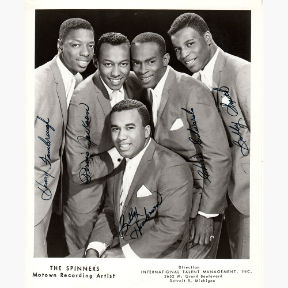 (L to R) Henry Fambrough, Pervis Jackson, Billy Henderson. Chico Edwards, Bobby Smith
(L to R) Henry Fambrough, Pervis Jackson, Billy Henderson. Chico Edwards, Bobby Smith
Harvey Fuqua was a founding member of the Moonglows. After he left the group in late 1958, he moved to Detroit with Marvin Gaye and began working with Anna Records which was enjoying a big hit with Barrett Strong’s “Money”. Fuqua helped Gaye get signed to Motown and, he started his own labels, Tri-Phi and Harvey Records in Detroit in 1961.
While in the Motor City, Fuqua saw the Spinners perform and heard something in their splendid vocal blend. He began working with the group, polished their vocals, and signed them to his Tri-Phi label. In the spring of 1961, Fuqua took the Spinners to Chicago to record a delightful doo wop song called “That’s What Girls Are Made For” that he’d co-written with Barry Gordy’s sister, Gwen Gordy. The ballad was Tri-Phi’s debut single; and it became a big hit during the summer, reaching at # 5 on Billboard’s R&B chart and crossing over to # 27 on the Hot 100. Listen to "That's What Girls Are Made For": https://www.youtube.com/watch?v=LrzR5yCLJEQ
The Spinners’ follow-up single on Tri-Phi was released in November of 1961. The ballad “Love (I Am So Glad I Found You)” was only a minor hit, however, spending just one week on the Hot 100 and peaking at # 91. The group underwent another personnel change during the Tri-Phi years when George Dixon was replaced by Edgar “Chico” Edwards in 1962.
The group would release three more singles on Tri-Phi: “What Did She Use?” backed with “Itching For My Baby, But I Don’t Know Where To Scratch”, “I’ve been Hurt” b/w “I Got Your Water Boiling, Baby (I’m Gonna Cook Your Goose)”, and under the name Bobby Smith & The Spinners: “She Don’t Love Me” b/w “Too Young, Too Much, Too Soon”, but nothing charted.
In 1963, Harvey Fuqua sold his labels to Motown, and the Spinners came along as part of the deal. The group found themselves stuck among the second tier of acts at Motown, where the best songs went to the biggest acts on the label. It took a while, but Motown finally released a Spinners’ single in late 1964. The a-side was “Sweet Thing”, an upbeat composition by Mickey Stevenson that failed to chart. It was backed with “How Can I”, written by Harvey Fuqua and Gwen Gordy.
The Spinners’ first Motown hit came with their next release in early 1965. Written by Mickey Stevenson and Ivy Jo Hunter, “I’ll Always Love You” reached # 8 on the R&B chart and crossed over to # 35 on the Hot 100. Listen To "I'll Always Love You": https://www.youtube.com/watch?v=M3Lttt9OsEk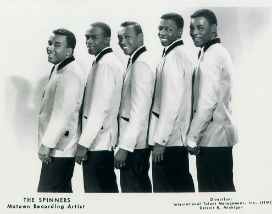 The Spinners
The Spinners
With releases by the Supremes and the Four Tops dominating the Motown label, it took over a year before the Spinners put out their follow-up single. “Truly Yours”, an upbeat number again written by Stevenson and Hunter, went to # 16 on the R&B chart but didn’t make the Hot 100, stalling at # 111.
The next single, “For All We Know”, was issued a year later but it failed to chart. Motown released the group’s first album, “The Original Spinners”, in the summer of 1967. Meanwhile, the group perfected their choreography with Cholly Atkins and toured with Marvin Gaye’s revue; but they couldn’t pay the bills by performing alone, so they moonlighted as chaperones, drivers, and road managers.
G.C. Cameron, who took over for Chico Edwards after completing a tour of Vietnam in 1967, said this about the other group members: “They chauffeured the Temptations around so much, they thought they were the Tempts’ drivers. They paid some serious dues.” 
Cameron, who contributed most of the lead vocals on the Spinners’ remaining Motown releases, got into the group because of his friendship with Dennis Edwards. Years before, Cameron and Edwards had done some singing together in a small club on Joy Road. Edwards knew that the Spinners were looking for someone and recommended Cameron.
G.C. Cameron debuted with the Spinners on “I Just Can’t Help But Feel The Pain” b/w “Bad, Bad Weather (Till You Come Home)” in the fall of 1968. It would be the group’s last release on the blue and silver Motown label; as the company switched the Spinners to the V.I.P. subsidiary for the rest of their recording contract.
The Spinners’ first release on V.I.P. was a cover of the Moonglows’ 1955 classic “In My Diary” in 1969. Harvey Fuqua had recorded the original with the Moonglows, and even though he produced the Spinners’ version, it failed to chart.
Norman Whitfield produced the group’s first single of 1970, “Message From A Black Man”. The song was composed by Whitfield and Barrett Strong and had been recorded the previous year by the Temptations for their “Puzzle People” album, but it failed to find an audience. 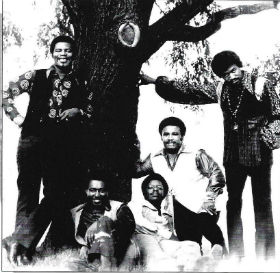 (L to R) P. Jackson, B. Smith, H. Fambrough, B. Henderson, G. C. Cameron
(L to R) P. Jackson, B. Smith, H. Fambrough, B. Henderson, G. C. Cameron
It took the talent of Stevie Wonder to restore the Spinners to the charts. Stevie co-wrote, produced, and played several instruments on the stunning “It’s A Shame” single, issued during the summer of 1970. Cameron and Wonder had become close friends, and one night after driving Stevie home from a club, Wonder told him that he had been working on a song for the group and played him “It’s A Shame” in his basement studio. Cameron said that the Spinners recorded it the next day, but that it took almost a year to finally get it released. Listen to "It's A Shame": https://www.youtube.com/watch?v=WoZP18U5VyY
After “It’s A Shame” hit big during the summer, Motown released the group’s second LP, “2nd Time Around” in the fall. The label then arranged for Stevie Wonder to produce the Spinners’ follow-up single in early 1971. Wonder co-wrote “We’ll Have It Made” with his wife Syreeta, and the song reached # 20 on the R&B chart and # 89 on the Hot 100.
When the Spinners’ contract with Motown was about to expire, Aretha Franklin suggested that they sign with her label, Atlantic Records. Cameron was still contractually obligated to Motown, however, and couldn’t switch labels. He stayed on as a solo artist at Motown and suggested that his cousin, Philippe Wynne, replace him when the group moved to Atlantic. It was there that the Spinners embraced the sleek Philly sound, and they were selected by Thom Bell as the perfect vehicle for his burgeoning creative talents as a producer, arranger, and composer. 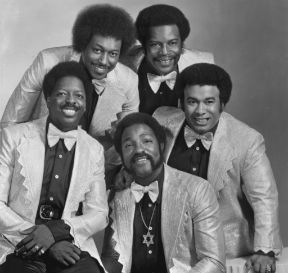 Spinners 1970's: (Top) B. Smith, P. Jackson (Bottom) H. Fambrough, Philippe Wynne, B. Henderson
Spinners 1970's: (Top) B. Smith, P. Jackson (Bottom) H. Fambrough, Philippe Wynne, B. Henderson
For more than five years, Bell and his songwriting partner Linda Creed brought out the best in the Spinners by providing them with some of the sweetest soul titles ever written. The group responded with highwire vocal performances that made them one of the most successful vocal groups of the 1970’s.
The Bobby Smith-led “I’ll Be Around”, their first Top Ten hit, was actually the b-side of their initial Atlantic single, “How Could I Let You Get Away”. DJs flipped the record over, however, and radio airplay for “I’ll Be Around” pushed it all the way to # 3 on he Hot 100, while the original a-side, (the Wynne-led) "How Could I Let You Get Away", peaked at # 77. "I'll Be Around" was also the Spinners' first million-selling hit single, as it spent an impressive five weeks at # 1 on the R&B chart. Watch the Spinners perform "I'll Be Around": https://www.youtube.com/watch?v=NfG47NsWVYA
Their follow-up single, “Could It Be I’m Falling In Love”, was released in late December. The song was co-written by brothers Mervin and Melvin Steals who worked for Atlantic. Bell produced the song at Philadelphia’s Sigma Sound Studio, and the MFSB house band again provided the instrumental backing. Bobby Smith sang lead through most of the song, and then Philippe Wynne handled the vocal on the song’s outro. “Could It Be I’m Falling In Love” equaled the success of its predecessor, peaking at # 1 R&B and # 4 on the Hot 100 and selling over one million copies. 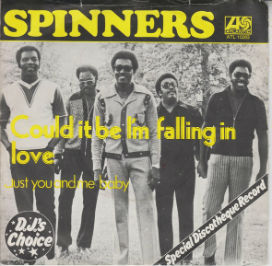 "Could It Be I'm Falling In Love" 45
"Could It Be I'm Falling In Love" 45
The Spinners made it three # 1 R&B singles in a row when “One Of A Kind (Love Affair)” reached the top spot in the spring of 1973. It peaked at # 11 on the Hot 100 and also sold over one million copies, but the song was also the subject of some controversy.
When the single was first released, there was some confusion as to whether the song contained a curse word in the section immediately following the instrumental break. Some heard the lyric that Philippe Wynne sang as “One of a kind love affair, makes you want to love her, you just got to fuck her, yeah.” Most others heard the allegedly offensive line as “You just got to hug her, yeah”. Regardless, Atlantic quickly responded to the complaints by reissuing the song with the three lines edited out. The “One of a kind love affair makes a lame man walk, makes a blind man talk about seeing again” lyric was moved up to right after the instrumental break, avoiding further debate. Did the song contain the dreaded f-word? Listen to the original version of “One Of A Kind (Love Affair)”:https://www.youtube.com/watch?v=l8uRhUSPBjk
The controversy did not seem to hurt the Spinners one bit; as their parade of chart hits continued with “Ghetto Child, # 4 R&B, “Mighty Love Pt. 1”, # 1 R&B, and “I’m Coming Home”, # 3 R&B. All three single were also Top 40 hits on the Hot 100 in 1973 and 1974. The only group that could even begin to compare with the Spinners’ incredible chart success at this time was the O’Jays. 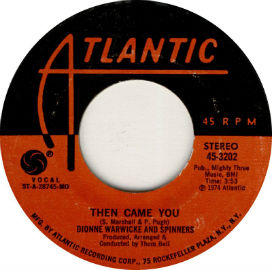 Duet with Dionne Warwicke
Duet with Dionne Warwicke
The Spinners’ biggest hit on the Hot 100, however, was a duet with Dionne Warwick on “Then Came You”. The single was released during a time that Warwick’s chart success had started to wane, and she had begun adding an “e” to her last name after signing with Warner Bros. Records. “Then Came You” was recorded as a duet with the Spinners’ lead singer Bobby Smith, but Philippe Wynne took over the lead duties at the end of the song. The Grammy-nominated song became the first # 1 hit on the Hot 100 for both Dionne Warwick(e) and the Spinners, and it dominated radio playlists during the summer of 1974. Listen to "Then Came You": https://www.youtube.com/watch?v=uOViqvRsIgo
The group continued its success on the R&B charts with “Love Don’t Love Nobody Pt. 1”, a # 4 R&B hit in the fall of 1974, and with “Living A Little, Laughing A Little”, and “Sadie”, both reaching # 7 on the R&B chart in 1975. The Spinners’ next big hit on the Hot 100, however, came during the summer of 1975 with “They Just Can’t Stop It the (Games People Play)”. The song peaked at # 5 on the pop chart and was also the group’s 5th R&B # 1 hit.
After two lesser hits with “Love Or Leave” and “Wake Up Susan” earlier in 1976, the Spinners bounced back in a major way with “The Rubberband Man” in the fall of the year. The song, written by producer Thom Bell and singer-songwriter Linda Creed, was about Bell’s son, who was teased by his classmates for being overweight. Intended to improve his son’s self-image, the song eventually evolved from being about “The Fat Man” to “The Rubberband Man”. The single spent three weeks at # 2 on the Hot 100 and topped the R&B chart at the end of 1976. The song, with its impressive choreography has become a highlight of the Spinners’ live performances. Watch the Spinners perform “The Rubberband Man”: https://www.youtube.com/watch?v=kKbADFJOCkU
"The Rubberband Man” was the last major hit to feature Philippe Wynne on lead vocals, and the group’s relationship with Thom Bell began to draw to a close. The group’s next two singles, “You’re Throwing A Good Love Away” and “Heaven On Earth (So Fine)” both failed to reach the Top 40, and Philippe Wynne left the Spinners after one too many arguments with producer Thom Bell. Wynne was replaced by John Edwards.
After the “If You Wanna Do A Dance" single failed to make the Top 40 in 1978, the Spinners parted ways with Thom Bell. They remained on good terms with their former producer, however, and the group contributed two songs and appeared as a band in The Fish That Saved Pittsburgh, a sports comedy film that Bell was involved with. 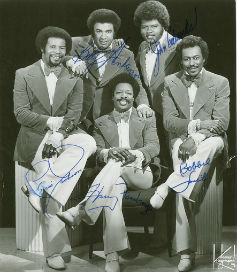 Spinners 1980's: (L to R) Jackson, Henderson, Fambrough, John Edwards, and Smith
Spinners 1980's: (L to R) Jackson, Henderson, Fambrough, John Edwards, and Smith
The Spinners had a brief resurgence at the start of the new decade, scoring two big hits with new producer Michael Zager. The medley of “Working My Way Back To You/Forgive Me, Girl” spent two weeks at # 2 on the Hot 100 in early 1980. The group followed it up with another medley, “Cupid/I’ve Loved You For A Long Time”, five months later. It was also a solid hit, reaching # 4 on the Hot 100. Both medleys were also Top Ten R&B hits.
Success began to wane in the years that followed, however. The Spinners’ last chart entry in the Hot 100 was a remake of Willie Nelson’s “Funny How Time Slips Away”, which peaked at # 67 in 1983. The following year, the group had their final R&B hit with “Right or Wrong” which reached # 22. The group would go on to perform the title track to the 1987 hit film Spaceballs, but their time as commercially successful recording artists had come to an end.
The Spinners continue to be a popular attraction on the “oldies” circuit, but the only surviving member of the group is Henry Fambrough. Although the Spinners became part of the Vocal Group Hall of Fame in 1999, they have yet to be inducted into the much more prestigious Rock and Roll Hall of Fame.
In 2017, the Spinners were selected as one of the Historical Inductees to the Michigan Rock and Roll Legends Internet Hall of Fame. "Could It Be I'm Falling In Love" was voted a Legendary Michigan Song in 2018.
MRRL Hall of Fame: https://www.michiganrockandrolllegends.com/mrrl-hall-of-fame
Source: The best account of the Spinners’ early years can be found in Bill Dahl’s excellent book, Motown: The Golden Years. Most of the information regarding the group’s recordings on the Tri-Phi and Motown labels was taken from Dahl’s research.
